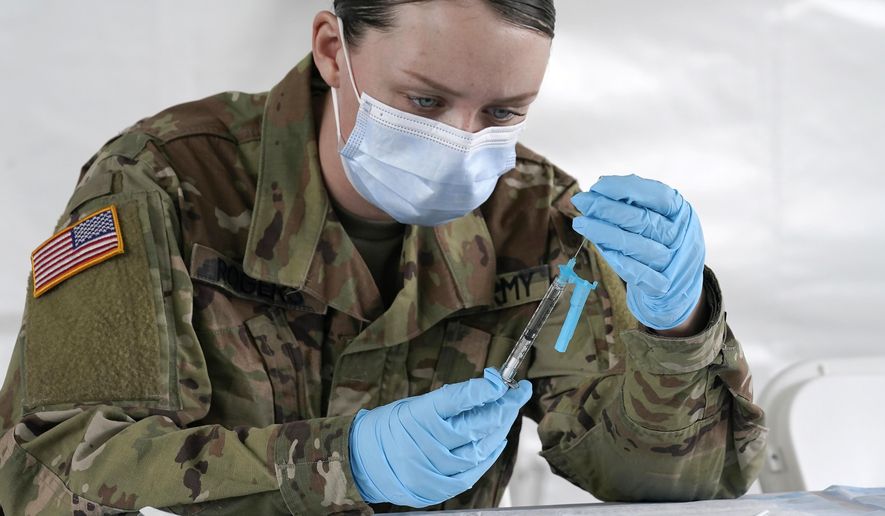Not getting the COVID-19 shot is no longer an option for almost all members of the U.S. military. With the Food and Drug Administration’s decision Monday to approve general use of the Pfizer vaccine, the Department of Defense is now requiring it as part of military service throughout the force.
On Tuesday, Secretary of Defense Lloyd Austin issued a memo directing senior Pentagon leaders to enact “ambitious timelines” for implementing the new vaccine requirements. The military services will make regular reports on their progress, he wrote.
According to the memo, reservists and members of the National Guard also will be required to get the COVID-19 vaccine.
“To defend this nation, we need a healthy and ready force,” Mr. Austin wrote. “I have determined that mandatory vaccination against (COVID-19) is necessary to protect the force and defend the American people.”
According to Aug. 18 Pentagon data, more than 1,077,000 military personnel across all the services are fully vaccinated for COVID-19 and more than 244,000 are considered partially vaccinated. About 800,000 troops have yet to get their shots, according to The Associated Press.
The memo says only COVID-19 vaccines that have received full approval from the FDA will be administered to the troops. Those receiving the shots are considered fully vaccinated two weeks after completing the second dose of a two-dose COVID-19 vaccine or two weeks after receiving a single dose of a one-shot vaccine.
“Those with previous COVID-19 infections are not considered fully vaccinated,” Mr. Austin wrote in his memo.
The new Pentagon policy does grant some exceptions, however. Service members taking part in coronavirus clinical trials are exempt from mandatory vaccination against COVID-19 until the trial is complete to avoid invalidating the results.
For months, the Pentagon has urged, cajoled, and pleaded with the troops to get the COVID-19 vaccine. They’ve even tapped into social media at times to encourage participation in the program among the youngest troops.
“Our administration of safe, effective COVID-19 vaccinates has produced admirable results to date,” Mr. Austin wrote.
The decision to order COVID-19 shots for all members of the armed forces shouldn’t be a surprise. Earlier this month, Mr. Austin said he would issue the guidance once the FDA signed the approval.
Even as it issues mandatory vaccine orders, the Defense Department is contending with the highly contagious delta variant. According to August 2021 data, there have been more than 222,000 cases of COVID-19 in the military and 34 deaths that have been linked to the coronavirus.
“Our vaccination of the force will save lives,” Mr. Austin wrote in his memo.
Greg Rinckey, a former Army lawyer who now practices as a civilian attorney in Albany, New York, wasn’t surprised to see the Defense Department memo come out once the FDA granted its approval. His office has received a number of calls from service members who said they didn’t want to take the shots.
“Before the vaccine received FDA approval, their arguments were a lot stronger,” Mr. Rinckey told The Washington Times in an interview. “Now that it has received full FDA approval, that closes a lot of doors.”
Most of the troops who called his office for legal advice said they didn’t want to take the COVID-19 vaccination because at that point it was still considered an experimental drug.
“They said, ‘We don’t want to be guinea pigs,’” Mr. Rinckey said.
Now that Mr. Austin issued the order, military personnel could face legal jeopardy for refusing to get the shot. Mr. Rinckey said they could be charged with failing to obey a lawful order.
“The (commanders) have a wide range of tools available to them,” Pentagon chief spokesman John Kirby told reporters on Wednesday. “We fully anticipate our troops are going to follow lawful orders.”
Service members are going to be required to present some kind of documentation, such as a letter from a physician, if they plan to avoid taking the COVID-19 vaccine on medical grounds, such as having a compromised immune system, Mr. Rinckey said.
• Mike Glenn can be reached at mglenn@washingtontimes.com.




Please read our comment policy before commenting.